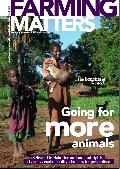Water is a scarce resource, and one which is unevenly distributed. Estimates say that only one percent of the world’s water resources are fresh and renewable, and thus available for man’s many uses.

Agriculture uses 70 percent of this, and much more water is required if we are to increase production. Population growth, deforestation, urbanisation, industrialisation, and certainly climate change, all point to a worsening situation. How are small-scale farmers, and the institutions that support them, getting ready to tackle this situation?
Can we be more efficient?
At least 60 percent of the world’s food is produced under rainfed conditions. For the millions of farmers who do not have access to irrigation, an uneven distribution of water means much lower yields, and therefore less production. Providing irrigation water is expensive, and irrigated areas also face difficulties. The overexploitation of groundwater has dramatically reduced its availability, while many canal-irrigated fields have become salinised – with the Aral Sea, in the old Soviet Union, as the best example of a manmade disaster.
If water is an increasingly scarce resource, how do we ensure its availability for agriculture, and also for sanitation and all our other needs? What steps are being taken in order to diminish uncertainty, or in order to make the best decisions? What rights, and what possibilities, do small-scale farmers have in order to increase yields, and improve their livelihoods? In this coming issue of Farming Matters we want to explore how groups of farmers, communities, or various stakeholders are working together, look at the co-ordinated steps which are needed at a watershed level, and at the possibilities for improving our overall efficiency.
Send us an e-mail!
The AgriCultures Network welcomes your contributions for our September issues. Featuring practical experiences from the field, our regional editions will look at micro-irrigation techniques, storing water, or at local level co-ordination approaches. Our global edition, Farming Matters, will complement the regional editions, addressing water management from a broader perspective. How can policies support small-scale farmers in improving their access to water? How can good governance ensure a more prudent, less wasteful use of water, and promote the production and consumption of water efficient crops? How can urban planners create space for urban agriculture that uses recycled wastewater? And finally, how can we, as a global movement for sustainable family farming, argue the case for low carbon agriculture as it implies better water management and greater resilience against drought and floods?
Send us your suggestions for articles, the articles themselves, photographs, names of people you feel we should talk to, ideas for topics you feel we must definitely address, your opinion, or just information about the issues mentioned above. As we are a global network, your contribution is bound to be useful to one of the editions.
You can send your ideas to Jorge Chavez-Tafur, editor, at j.chavez-tafur@ileia.org before May 15th, 2010. For more information on the AgriCultures Network, see www.agriculturesnetwork.org.


